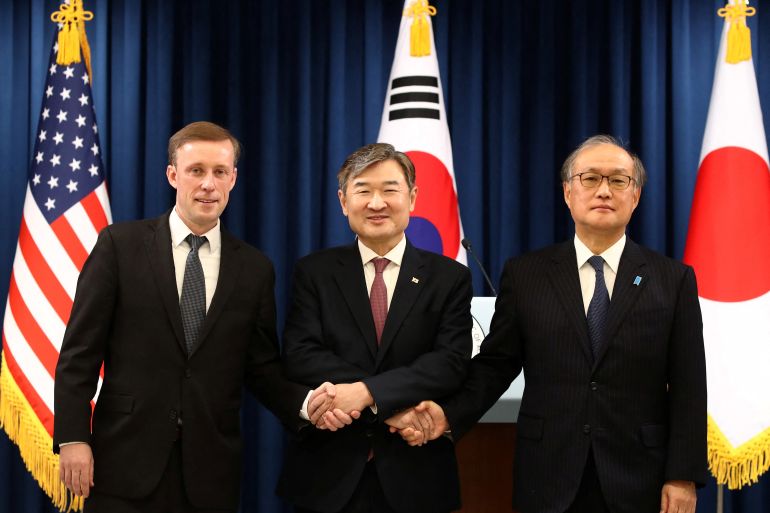US, Japan, South Korea step up efforts to counter North Korea cyber-threats
The three allies have expressed concerns about ‘malicious’ cyber-activities in support of Pyongyang’s banned weapons programmes.

The United States, South Korea and Japan have agreed on new efforts to respond to North Korea’s threats in cyberspace, according to national security advisers from the three countries meeting in Seoul.
The allies “launched new trilateral initiatives to counter the threats posed by the DPRK, from its cybercrime and cryptocurrency money laundering to its reckless space and ballistic missile tests,” White House National Security Advisor Jake Sullivan told reporters on Saturday, referring to North Korea by its official name, the Democratic People’s Republic of Korea.
Keep reading
list of 3 itemsRussia’s Lavrov visits North Korea amid claims of military cooperation
South Korea hosts Japan, China as US allies try to reassure Beijing
“This will be a new effort with respect to cryptocurrency and money laundering and how we disrupt North Korea’s capacity to gain revenue from the hacking and stealing of cryptocurrency and then laundering it through exchanges,” he said at a joint news conference with his Asian counterparts.
Sullivan said the meeting followed up on commitments made at a trilateral summit hosted by President Joe Biden in August, where leaders pledged to deepen security and economic cooperation.
At the time, the three countries expressed deep concern over what they described as North Korea’s “malicious” cyber-activities in support of its banned weapons programmes.
Cryptocurrency funds stolen by North Korean hackers have been a key source of funding for the country’s weapons programmes, according to the United Nations, with such theft reaching a record last year. Pyongyang has denied allegations of hacking or other cyberattacks.
Takeo Akiba, Japan’s national security secretariat secretary general, said that North Korea’s “illicit cyber activities” had emerged as the most recent challenges, calling them “a source of funds” for the isolated state’s nuclear missile development.
Russia-North Korea ties
The meeting in Seoul on Friday and Saturday came as tensions on the Korean peninsula are at their highest in years, with North Korean leader Kim Jong Un accelerating the expansion of his nuclear and missile programme and flaunting an escalatory nuclear doctrine that authorises the preemptive use of nuclear weapons.
The United States and its Asian allies have responded by increasing the visibility of their trilateral partnership in the region and strengthening their combined military exercises, which Kim condemns as invasion rehearsals.
Washington, Seoul and Tokyo have also expressed concerns about a potential arms alignment between North Korea and Russia.
They worry Kim is providing badly needed munitions to help Russian President Vladimir Putin wage war in Ukraine in exchange for Russian technology assistance to upgrade his nuclear-armed military – something both Moscow and Pyongyang have denied.
Cho Tae-yong, South Korea’s national security office director, said on Saturday that the three security advisers reaffirmed North Korea’s obligations under multiple United Nations Security Council resolutions that call for its denuclearisation and ban any weapons trade with other countries, and agreed to strengthen coordination to ensure that is implemented.
Akiba said the “unprecedented frequency and patterns” of North Korean ballistic missile launches necessitate a deeper and more effective partnership between Washington, Seoul and Tokyo.